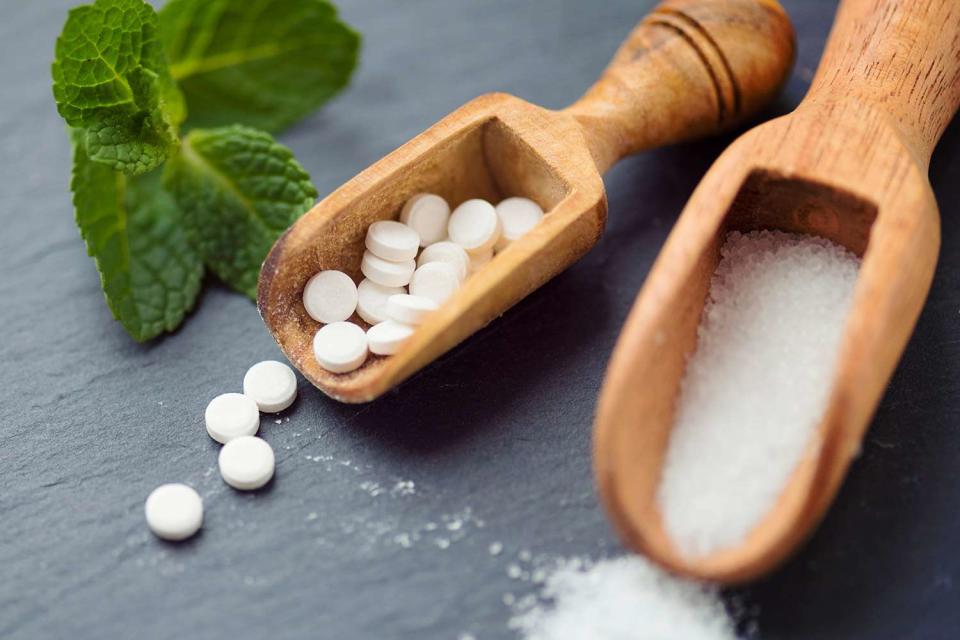WHO to Announce Artificial Sweetener Aspartame May Cause Cancer
The popular sugar substitute will be listed as "possibly carcinogenic to humans" in July

Getty
Popular sugar substitute aspartame expected to be announced as a possible carcinogen.Aspartame — the popular sugar substitute found in sodas, candy and more — will be declared a possible carcinogen by the International Agency for Research on Cancer (IARC), the cancer-researching arm of the World Health Organization (WHO) — Reuters says.
The ubiquitous sugar substitute is relied on for calorie restriction and found in hundreds of commonly available products. Since its initial approval in 1974, it’s been sold on its own under the brand names Nutrasweet, Equal, and Sugar Twin, and is often an ingredient in drinks like Diet Coke and packaged food like Sugar-Free Jello and Dannon Activia yogurt.
According to the U.S. Food and Drug Administration, aspartame “is about 200 times sweeter” than regular sugar.

Getty
Aspartame is expected to be declared a possible carcinogen by government agency.Never miss a story — sign up for PEOPLE's free daily newsletter to stay up-to-date on the best of what PEOPLE has to offer, from juicy celebrity news to compelling human interest stories.
But how much aspartame is safe to consume? The current recommendations require reading labels — and doing a bit of math, since, according to the FDA, “the acceptable daily intake for the sweetener is 50mg for each kilogram of body weight.”
A can of Diet Coke, for example, contains about 200 mg of aspartame.
While current FDA guidelines say a 132-lb. person would need to consume 75 packets of artificial sweetener per day to reach the acceptable limit, the Joint Expert Committee on Food Additives — a separate WHO and United Nations committee — is updating its risk assessment, including how much is safe to consume, according to CNN.
Related: Dog Owners Need to Watch Out For Xylitol: Dog Dies After Eating Brownies With Sugar Substitute
The problem with aspartame is how the chemical is metabolized in the body.
“This chemical is hydrolyzed and absorbed in the gastrointestinal (GI) tract. This process leads to the release of methanol, aspartic acid, and phenylalanine,” according to a report from news-medical.net.
The methanol is then converted to formaldehyde by the liver. “In addition to the direct damage methanol causes to the liver, formaldehyde is also directly toxic to liver cells and associated with cancer-causing properties,” the report said.
The FDA had previously advised certain individuals with a rare genetic disorder, phenylketonuria (PKU), to avoid consuming aspartame, due to a difficulty metabolizing the chemical. The disorder is diagnosed at birth by a routine heel-prick test.
This isn’t the first time aspartame has been linked to cancer; a 2022 French study found that “artificial sweeteners (especially aspartame and acesulfame-K), which are used in many food and beverage brands worldwide, were associated with increased cancer risk.”
Related: Cancer-Causing 'Forever Chemicals' Found in Many Kinds of Contact Lenses, Study Finds
Aspartame isn’t the only sugar substitute that’s come under scrutiny for health risks; in February, a study found that erythritol — a popular staple in low-carb and keto diets — is linked to blood clotting, stroke, heart attack and death.
Last month, WHO advised against using artificial sweeteners for weight control, suggesting "potential undesirable effects" like "an increased risk of type 2 diabetes, cardiovascular diseases, and mortality in adults."
The IARC’s findings on aspartame are due to be announced on July 14 — and revised guidelines on safe daily allowances are expected to follow.
For more People news, make sure to sign up for our newsletter!
Read the original article on People.

 Yahoo News
Yahoo News 
